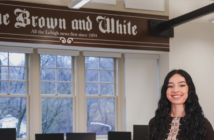
Klaudia Jazwinska
In the three months preceding the 2016 presidential election, fake news stories generated more engagement on Facebook than top stories from major news outlets.
This leads me to wonder how much of what we know about the campaign was influenced by these fraudulent sources.
In a Brown and White political survey from earlier this month, less than 2 percent of Lehigh students reported they wholeheartedly trust election coverage from mainstream media.
I understand it’s easy to blame the media for misrepresenting facts or omitting key details. Hell, I complain about them all the time.
As a student journalist and an editor, however, I know that some of the core tenets of good journalism are research, attention to detail and balanced reporting.
Those responsibilities shouldn’t just apply to those of us in — or aspiring to be in — the media industry. As members of a deeply interconnected society, we have a responsibility not to be lazy with our information gathering.
No one lives in a vacuum. Your ignorance can have an impact on others’ existence. You can’t just ignore facts and move on with your life with the expectation you won’t do any harm.
I’m not trying to be a moral authority on truth, nor am I trying to tell you how you should live your life. If nothing else, I’d like to encourage you to be more conscious and critical about the information you consume daily.
Particularly in light of the recent election, the sharing of fake news has become something of an epidemic.
Algorithms on social media sites like Facebook are designed to display content that best aligns with your interests, which means much of the information you see serves to validate your existing beliefs. And, until recently, these algorithms didn’t discriminate between fake and real news.
In an effort to help combat this issue, students from Purdue University developed a Chrome browser extension called FiB, which tags links in Facebook feeds as verified or not verified based on factors such as source credibility and cross-checking content.
Being stuck in a bubble of confirmation bias means you inevitably ignore information or opinions that don’t fit your interests. And you find yourself with a skewed understanding of the world around you.
Though difficult, it’s important not to let your emotions get in the way of the truth. This is a challenge I have certainly faced both in my personal life and in my time as an editor, and will undoubtedly continue to grapple with throughout my future career.
Now more than ever, I would argue, it’s imperative that we be conscious, critical consumers of information.
Words are powerful. They can be used to inform, to console or to fear-monger. And when we aren’t reading them critically, we can unintentionally fall victim to their influence.
When reading news, be critical and vigilant. Read beyond the headline. Check the byline. Check the date of publication. Check the URL.
Similarly, in conversations, consider speakers’ potential biases. Encourage a discourse that is open to a variety of perspectives. Don’t be afraid to question certain claims.
It can be hard to know who or what to trust, and in a time of great political and social divisiveness, finding the truth can be especially difficult.
If you know me, or if you’ve read any of my past edit desks, you’ll know that I’m strongly opposed to the spread of misinformation. It’s a large part of why I decided to pursue journalism as one of my majors.
This is why I was surprised the other day when I was accused of slander and libel for an article I wrote. A commenter said I should be “fired immediately” and had no right to call myself a journalist.
Had the commenter taken the time to fully read my story, she would have realized her criticism was unbased and easily disputed.
Though the situation was eventually cleared up, her words — though misinformed — did leave an impact.
Being informed can help you better understand your frustrations and your anxieties about the world around you, and can help you more acutely channel those emotions to affect change.
In the words of my boy George Orwell, “In a time of deceit, telling the truth is a revolutionary act.”
_
Klaudia Jazwinska, ’18, is the news editor for The Brown and White. She can be reached at [email protected].





Comment policy
Comments posted to The Brown and White website are reviewed by a moderator before being approved. Incendiary speech or harassing language, including comments targeted at individuals, may be deemed unacceptable and not published. Spam and other soliciting will also be declined.
The Brown and White also reserves the right to not publish entirely anonymous comments.